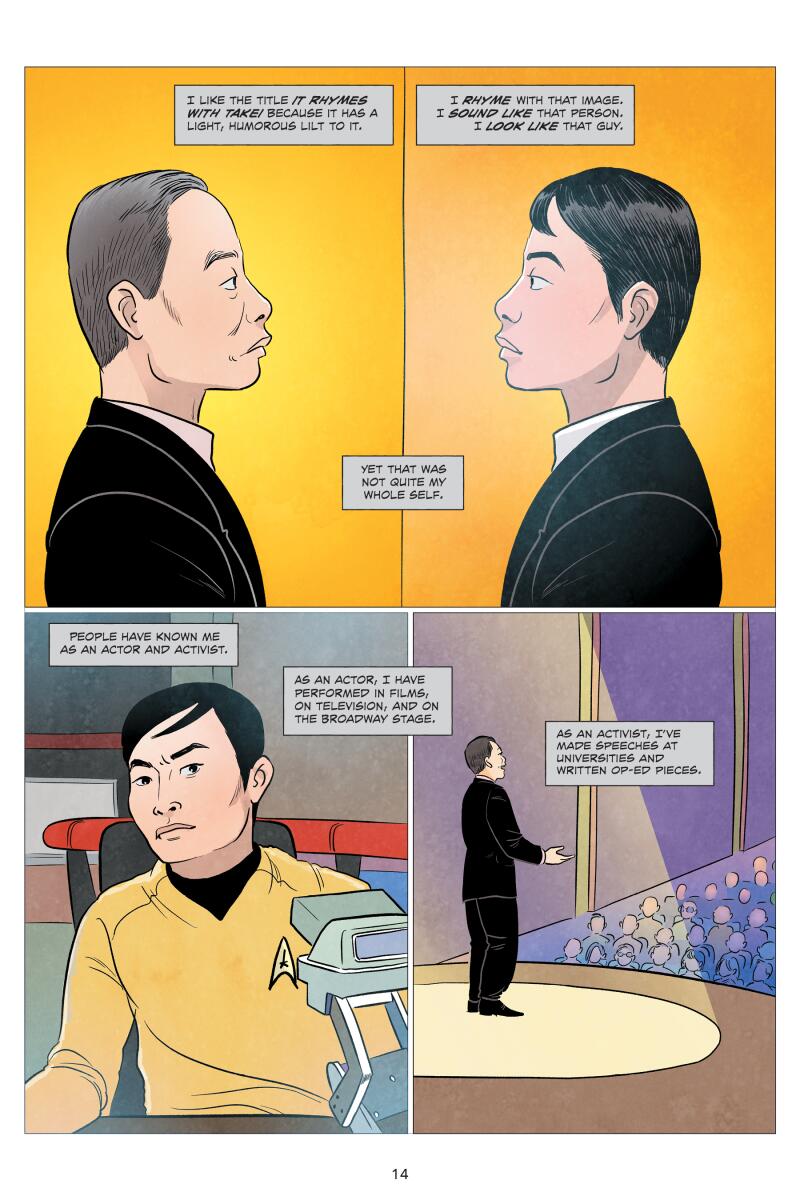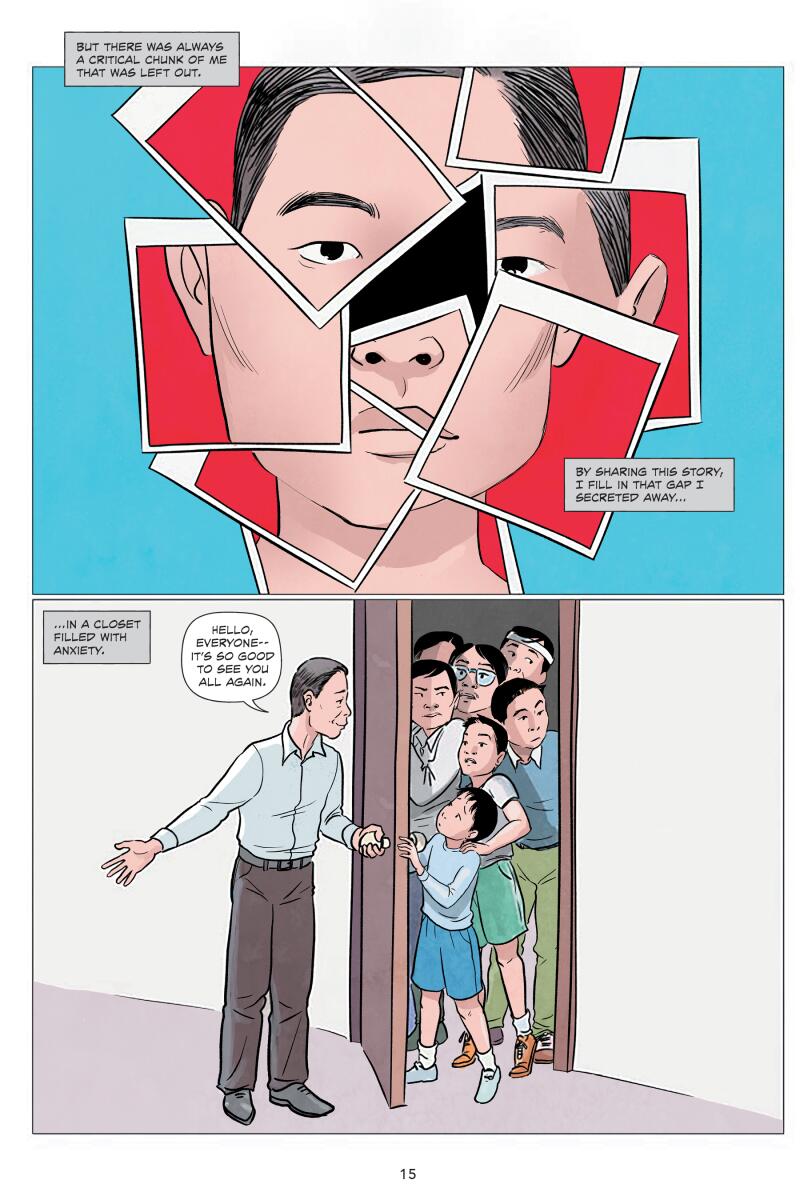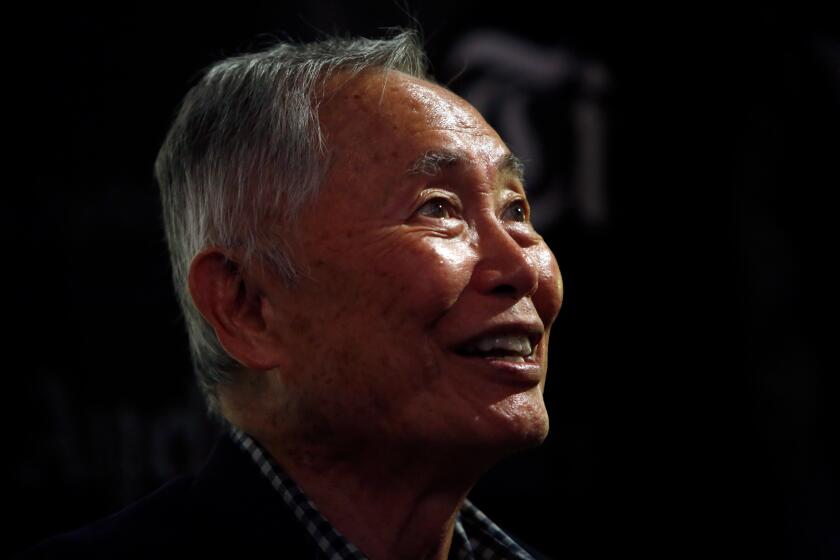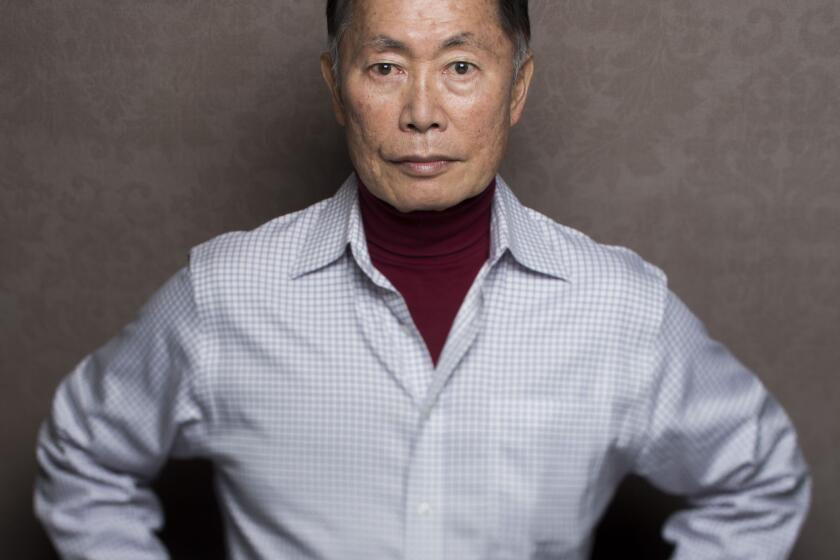George Takei believes our democracy will be OK — once the ‘Klingon president’ is out of office

- Share via
On the Shelf
It Rhymes With Takei
By George Takei, Steven Scott, Justin Eisinger and Harmony Becker (illustrator)
Top Shelf Productions: 336 pages, $30
If you buy books linked on our site, The Times may earn a commission from Bookshop.org, whose fees support independent bookstores.
Before George Takei broke out with his role on “Star Trek” and became a cultural icon, his last name was often mispronounced.
Instead of “tuh-kay,” some people would say “tuck-eye.”
“I told them that’s a mispronunciation, but I don’t object to it because the word takai in Japanese means ‘expensive,’” the actor and advocate says during a recent Zoom call from Boston. “In fact, I told this to [‘Star Trek’ creator] Gene Roddenberry when he was interviewing me and he said, ‘Oh my goodness, a producer doesn’t like to call an actor expensive. Takei is OK.’”
Having to educate people about his name is one of the reasons he included it in the playful title of his latest graphic memoir, “It Rhymes With Takei.”
“I didn’t want it to be in their face,” says Takei. “I thought I’d use [my name] in the title and make the reader work a little bit … Takai? Takei? May, day, pay, say, gay. Oh, gay!”
George Takei brings “They Called Us Enemy” to the L.A. Times Book Club
Out Tuesday, “It Rhymes With Takei” is about the actor’s experiences growing up gay at a time when it was much less safe — and thus less common — to be out. The book details Takei’s story from his earliest childhood crushes to being compelled to come out in 2005 and becoming the outspoken LGBTQ+ rights activist he is today.
For “It Rhymes With Takei,” the author once again teamed up with writers Steven Scott and Justin Eisinger and artist Harmony Becker, his collaborators for “They Called Us Enemy,” the 2019 graphic memoir about Takei’s childhood imprisonment in incarceration camps during World War II.
Takei is no stranger to sharing personal stories. In addition to his books, he has been the subject of a documentary. There is a musical loosely inspired by his time in wartime incarceration camps. In the last 20 years, he’s also discussed his experiences as a gay man, especially as it relates to the rights of the LGBTQ+ community, but “It Rhymes With Takei” is his first deep dive into his full story.


Pages from “It Rhymes With Takei,” a graphic memoir by George Takei, Steven Scott, Justin Eisinger and Harmony Becker. (Top Shelf Productions)
Born in Boyle Heights, Takei was just 5 when he and his family were forced out of their Los Angeles home as part of the mass incarceration of Japanese Americans during the war. Because he was unjustly persecuted for his identity and perceived as “different,” when he realized he was different in another way he kept it close to his chest.
“I grew up behind very real barbed wire fences, but I created my own invisible barbed wire fence … and lived most of my adult life closeted,” says Takei, 88, who came out when he was 68. “My most personal issue had me imprisoned. … It was a different society that I grew up in. Being closeted was the way to survive if you’re LGBTQ.”
“But at the same time as I remained closeted, society was starting to change,” Takei continues. “It was changing because some LGBTQ people were brave enough [and] determined enough to come out and be active and vocal and engaged.”
Since coming out in 2005, Takei has been vocal about issues affecting the LGBTQ+ community, wielding his quick wit and gentlemanly poise — as well as his massive platform — to denounce discrimination, blast homophobic public figures and call out other injustices.
George Takei’s graphic memoir “They Called Us Enemy” depicts his childhood years in an internment camp during World War II.
In 2011, for instance, Takei offered his name to be used as an alternative to the word “gay” when Tennessee lawmakers were moving to prohibit teachers from any discussion of sexual orientation in the classroom. He continued to speak out against the so-called “Don’t Say Gay” bill when more states were pushing versions through their legislatures during a surge in anti-LGBTQ+ sentiment in 2022.
As Takei shares stories about his family moving to Skid Row after being released from the wartime incarceration camps, getting introduced to radio and comic books as he adjusted to his new life and the aspirational ideals upheld by “Star Trek,” he occasionally glances off-screen to banter with his husband, Brad, who is out of frame but close enough to interject if he chooses. They’re the sort of comfortable exchanges that come naturally between longtime couples.
But for most of his life, Takei believed that he could not be out if he wanted to pursue an acting career. He’d seen firsthand how rumors or getting outed affected the careers of others. And Takei admits that he felt guilty watching fellow members of the LGBTQ+ community as they fought for their rights while he remained silent.

When then-Gov. Arnold Schwarzenegger vetoed a marriage equality bill passed by California’s legislature in 2005, Takei knew he could no longer remain on the sidelines.
“I was so raging with anger,” says Takei, who did not reference Schwarzenegger by name. “We were getting so close [to marriage equality] and I was really elated. But we had a governor that was campaigning by saying, ‘I have no problem with it but I’m against it.’ … When the bill passed by both the Senate and the Assembly [and] landed on his desk, he vetoed it.”
“The hypocrite,” Takei continues with a raised voice, alluding to Schwarzenegger’s extramarital affair. “I was so angry and determined to come out and join in on the fight.”
Takei already had a reputation for fighting for causes he believed in. He volunteered with a humanitarian organization and was involved with student government at Mount Vernon Junior High. He was active in local politics in the 1970s and ‘80s. He’d also long been a part of the civil rights movement and opposed the Vietnam War.
“Participation in democracy, taking on the responsibility of democracy, was something that I was taught as a teenager to put our internment in context,” Takei says. “That led me to volunteer for other causes.”
He credits his father for instilling this sense of responsibility in him. As a teenager, when Takei became interested in understanding his childhood imprisonment beyond his own memories, he would sit down with his father after dinner to ask him about their time in the incarceration camps. During these conversations, Takei says his father would quote Abraham Lincoln’s Gettysburg Address.
“‘Ours is the government of the people, by the people and for the people,’” says Takei. “Those are noble ideals. That’s what makes American democracy great. But the weakness of American democracy is also in those words … because the people are fallible. They make mistakes.”


Pages from “It Rhymes With Takei,” a graphic memoir by George Takei, Steven Scott, Justin Eisinger and Harmony Becker. (Top Shelf Productions)
Even as these hard-fought rights have been backsliding in recent years as more states have moved to pass anti-LGBTQ+ legislation, Takei remains hopeful.
“Life is cyclical,” Takei says. “It goes in circles. … We’re constantly changing and transforming our society and ourselves.”
He points to how the Alien Enemies Act, which was invoked during World War II to wrongly justify the incarceration of 120,000 Japanese Americans, is once again being cited by the current administration in its efforts to deport immigrants. (Takei’s comments preceded the immigration raids and protests that occurred in L.A. over the weekend.)
“We have this egocentric monster [in office],” says Takei, raising his voice a second time. “He’s power-crazy and ... now he’s causing all sorts of outrageous inhumanity — it’s beyond injustice, it’s inhumanity — and we’re going through that again. The same thing that we went through [when we were] artificially categorized as enemy alien in 1942.”
Takei never once mentions Trump by name, instead calling him “a Klingon president,” referencing a well-known alien race from the “Star Trek” franchise.
“Klingons are the great threat to a more enlightened society who can see diversity as their strength,” says Takei. “We’ve got to be rid of him.” The depictions of Klingons have shifted over the years, but it’s clear Takei is invoking the more brutal, prideful and authoritarian version introduced in the original series in the 1960s. And in Roddenberry’s more idyllic vision of the future, humanity’s strength is in its diversity. (“Infinite diversity in infinite combinations,” says Takei.)
“I’m still optimistic,” Takei says. “These momentary blips in history eventually get overcome and are left behind. We will find our true path.”
More to Read
Sign up for our Book Club newsletter
Get the latest news, events and more from the Los Angeles Times Book Club, and help us get L.A. reading and talking.
You may occasionally receive promotional content from the Los Angeles Times.













